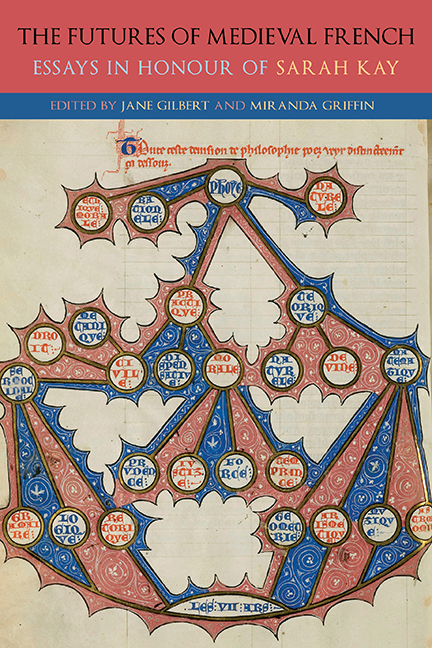Book contents
- Frontmatter
- Dedication
- Contents
- List of Illustrations
- List of Contributors
- List of Abbreviations
- Introduction
- Part I Subjectivity in Troubadour Poetry
- Part II The ‘Chansons de geste’ in the Age of Romance: Political Fictions
- Part III Courtly Contradictions: The Emergence of the Literary Object in the Twelfth Century
- Part IV The Place of Thought: The Complexity of One in French Didactic Literature
- Part V Parrots and Nightingales: Troubadour Quotations and the Development of European Poetry
- Part VI Animal Skins and the Reading Self in Medieval Latin and French Bestiaries
- Afterword
- General Bibliography
- List of Manuscripts
- Bibliography of Work by Sarah Kay
- Index
- Gallica
Introduction
Published online by Cambridge University Press: 27 May 2021
- Frontmatter
- Dedication
- Contents
- List of Illustrations
- List of Contributors
- List of Abbreviations
- Introduction
- Part I Subjectivity in Troubadour Poetry
- Part II The ‘Chansons de geste’ in the Age of Romance: Political Fictions
- Part III Courtly Contradictions: The Emergence of the Literary Object in the Twelfth Century
- Part IV The Place of Thought: The Complexity of One in French Didactic Literature
- Part V Parrots and Nightingales: Troubadour Quotations and the Development of European Poetry
- Part VI Animal Skins and the Reading Self in Medieval Latin and French Bestiaries
- Afterword
- General Bibliography
- List of Manuscripts
- Bibliography of Work by Sarah Kay
- Index
- Gallica
Summary
SARAH KAY's Work has always had a cheeky relationship to the canon. While not neglecting the so-called ‘classical’ troubadours, Subjectivity offered readings of an astonishing range of troubadours far less well known to modern criticism, but perhaps better representative of medieval tastes. Similarly, Political Fictions wilfully marginalised the Chanson de Roland to consider a large array of epic poems, many barely read since the Middle Ages, putting centre stage texts such as the riveting Occitan (and therefore marginal) chanson, Daurel et Beton. Thus, for all its interpretive originality and theoretical sophistication, Kay's work also has major ramifications for literary history in widening the field of vision and setting the modern canon better in context. Nowhere more so than in Parrots and Nightingales, which for the most part discusses texts it would be all too easy to dismiss as dull and to consider para-literary at best, possibly barely literary at all: grammars, poetic manuals, florilegia, verse encyclopaedias. Studying the widespread practice of quoting troubadour poetry over roughly 150 years from 1200 onwards, in a variety of places mainly outside Occitania, Kay shows how this practice drives and transforms poetic practice, retroactively installing the troubadours as foundational for European lyric. Then, in a ‘hey presto’ moment at the end of her book, she offers transformative readings of somewhat marginal texts by two highly canonical authors – Dante and Petrarch – demonstrating that in order to appreciate their work one needs to understand not only how they represent moments of genius and change in a continuous tradition of song deriving from the troubadours (the traditional view), but also and more importantly, their debt to and participation in the apparently arcane tradition of quoting troubadour poetry that Kay subjects to scrutiny.
If Kay's work has been most strongly associated with innovative approaches to medieval literature informed by modern critical theory, medieval and modern philosophy, and psychoanalysis, the import of the deep and exceptionally wide-ranging scholarly and philological underpinning of her work – reflecting her training by the formidable if little-published Oxford scholar Rhoda Sutherland – should not be underestimated.
- Type
- Chapter
- Information
- The Futures of Medieval FrenchEssays in Honour of Sarah Kay, pp. 229 - 232Publisher: Boydell & BrewerPrint publication year: 2021

